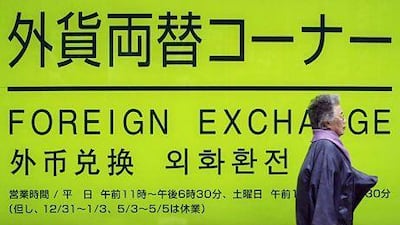Dark clouds have been gathering over the foreign exchange markets in recent weeks as concerns build about a resurfacing of a global currency war.
Japan has been caught in the cross hairs, as it stands accused of debasing the value of its currency to boost exports through a dovish policy approach.
The allegations come from leaders of France and some other struggling European countries, who feel the actions are driving up the value of the euro and hurting their exporters' competitiveness. The euro was the strongest performer among leading global currencies last month, rising by almost 10 per cent against the yen.
For investors looking for a return to stability after the choppiness caused by the financial crisis and the euro-zone meltdown, fluctuating currencies pose another risk to the global economy.
The battle lines were drawn when Japan's new prime minister Shinzo Abe urged the country's central bank to embark on aggressive monetary policy easing in an effort to stimulate the sickly domestic economy. In response, the Bank of Japan (BoJ) made an open-ended commitment to continue buying assets from next year, while doubling its inflation target to 2 per cent.
Morgan Stanley calls Japan's move a "game changer".
"If a weaker yen is an important pillar of the strategy to make this export-orientated economy more competitive again, it brings into the picture something that was missing from earlier incarnations among central banks of the advanced economies - competitive depreciation," it wrote in a research note last week. "This, in turn, takes us one step closer to a currency war."
It is nearly two and a half years since alarm about the risk of a global currency war was last sounded. Then, Guido Mantega, the Brazilian finance minister, directed his spleen at countries such as the United States and those in Europe, which were then embarking upon their own stimulus programmes. He did so as his country was flooded by a wall of capital inflows that pushed up the value of Brazil's currency and badly hurt the country's burgeoning export market. Brazil and other countries resorted to capital inflows to fight back.
Now the battleground has shifted to some of the globe's economic heavyweights. The French president François Hollande has been most vocal in raising concerns recently. Last week he urged euro-zone leaders to consider how the single currency bloc could operate a foreign exchange policy.
His anxiety reflects the struggle facing France's economy as it fights to emerge from recession.
Euro-zone governments gave up control over the exchange rates of their currencies when they joined the euro project. But the crisis has exposed the weakness of such a system.
"It's one currency but both France and Germany have diametrically opposed interests," said Tim Fox, the chief economist of Emirates NBD. "Germany's economy has showed signs of stabilisation but France is in the doldrums and so it's in their interests to have a cheap currency."
After slumping as low as US$1.2042 last year as investors worried that Spain or Italy might be swept into the euro-zone crisis, the common currency has picked up sharply. A revival in hopes about the future of the euro zone has underpinned the rise. But measures by central banks have also contributed to the increase.
While the US Federal Reserve has promised to keep interest rates low, both it and the Bank of England are still pushing ahead with quantitative easing. The BoJ's move has helped to push the yen down more than 13 per cent against the dollar and 18 per cent against the euro since the end of November.
In contrast, the European Central Bank's measures have had the opposite impact. After giving banks cheap loans last year, it is now reversing its approach by taking repayment.
Still, Mr Fox sees signs the euro may pare back some of its gains.
"The recovery in Europe is patchy at best and the structural issues have not gone away and political issues are still below the surface. These will all come back to hurt the euro," he said.

